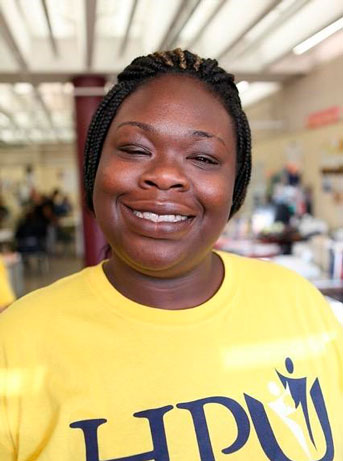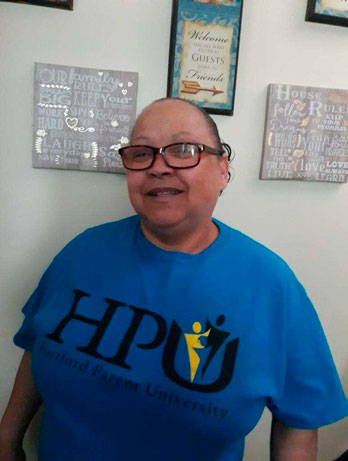Contact coaches

Tynima Toney
Tynima is a graduate of Hartford Parent University (HPU) and the No Child Held Back (NCHB) program. She’s an HPU Coach and Facilitator and has been affiliated with HPU for approximately 5 years. Her experience with HPU has taught her who to go to when she has an issue or concern and she loves sharing that information with parents and care givers. Tynima is very passionate when it comes to parents and their children and when it comes to supporting them and their rights.

Lucy Smith
Lucy is a graduate of Hartford Parent University (HPU) and the No Child Held Back (NCHB) program. She’s an HPU Coach and Facilitator. She has been affiliated with HPU for approximately 6 years. By being a part of HPU she feels that she has gained a better understanding of how to help her child navigate their way through the Hartford Public School system and loves sharing that information with other parents.

Milagros Vega
Milagros is a graduate of Hartford Parent University (HPU) and the No Child Held Back (NCHB) program. She’s an HPU Coach and Facilitator and has been affiliated with HPU for approximately 7 years. She also provides support for our Spanish speaking parents with children with special needs, teaching them the planning and placement team process. She is and has always been a big supporter of parent engagement and is affiliated with other Community Based Organizations.

Natalie Delgado
Natalie is a Hartford Parent University (HPU) Coach and Facilitator. She has been affiliated with HPU for 4 years. She provides verbal communication of HPU’s informational documents for our Non-English speaking parents and care givers. Her passion is helping parents understand their rights as it relates to our school system and helping their children get the quality education they deserve.
Why a 21st Century Teacher Isn’t Just a ‘Guide on the Side’
- Details
- Category: Uncategorised
The great fiction that a teacher today has become a ‘guide on the side’ is now hardwired into nearly every conversation about the future of teaching and learning. Teachers don’t deliver information any longer; they act as co-constructivists and facilitators, sitting shoulder to shoulder with students.
Why raise objections to this new narrative? First, it’s disingenuous. Teachers still stand at the front of the room. They teach, using traditional tools and tapping their repository of information to share with students. They lecture. Yes, sometimes too long, but a competent teacher knows when to sit down or ask questions.
The second objection is aimed at education’s habit of settling for shiny new terms when the facts demand a deeper commitment to truth telling. The truth is that in the emerging era of project based learning, personalization, 21st century skills training, commitment to social emotional growth, and attention to equity and social challenges, the complexities of teaching can’t be captured by a simple ‘You’re now a guide on the side’ mandate. Teaching in this ecosystem calls upon a rich, demanding skill set that has transformed the profession into one of the most complex, creative, and (potentially) rewarding jobs on the planet.
Given the numbers of teachers expressing dissatisfaction with their jobs, leaving the profession, or reporting burnout, one might conclude the opposite. But the turmoil can be traced to the system of pacing guides and testing that forces compliance. Educators are tired of teaching inside the lines. In schools focused on innovation, the job may be challenging, but it’s also energizing precisely because it invokes deep purpose and reward.
Acknowledging the new state of the profession is critical. With standards obsessed systems backed by high stakes testing wilting under the increasing pressure of on demand, self-directed learning, schools will yield to more flexible curriculum, online options, and strengths/skills outcomes supporting the journey of learning, not the final degree.
As systems change, inevitably a teacher’s role will have to be reconceptualized as a new mental model evolves around what it means to ‘teach.’ Evidence shows how difficult this mindshift will be. Despite the decades-old ‘guide on the side’ conversation, no corresponding attention is paid yet to developing the facilitation skills and coaching protocols that teachers need for effective people management. The focus instead remains on classroom management and traditional behavioral tools.
Preparing teachers for this new role amplifies the challenge. Under industrial rules, a teacher is trained (‘prepared’) to implement a skill—to follow a pacing guide, roll out a reading program, deliver content, and ‘manage’ a classroom. But already complex professions operating in dynamic environments foresee ‘training’ as obsolete. There is an increasing demand for the ‘T-shaped person’, who has both the breadth and depth to respond to variety and novelty.
The observational and relational skills necessary for deep facilitation and mentoring in inquiry environments meet this standard of complexity. Rather than being prepared, teachers will need to prepare themselves. Techniques will matter, but true competency will derive from experience, practice, and agile learning within an ecosystem of constant growth.
To read more click here
test template
- Details
- Category: Uncategorised
Youvel helpdesk
- Details
- Category: Uncategorised
404 Not Found
- Details
- Category: Uncategorised
Sorry, we could not find the page you were looking for...